The expulsion of the demons from Arezzo.
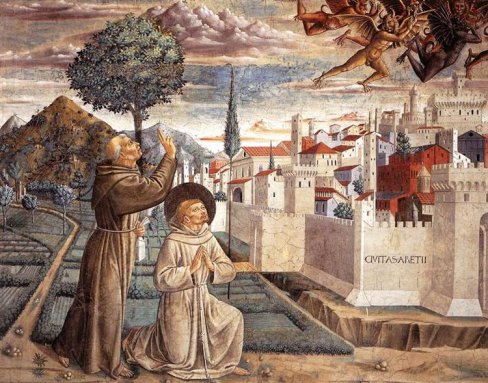
Benozzo Gozzoli: Expulsion of the Demons from Arezzo
Apsidal chapel, San Francesco, Montefalco
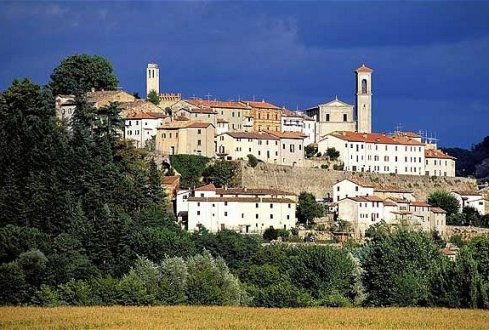
The view today
It befell once that he came unto Arezzo at a
time when the whole city was shaken by a civil war that threatened its
speedy ruin. As he was lodging in the outskirts of the city, he beheld
the demons exulting above it, and inflaming the angry citizens unto
mutual slaughter. Then, that he might put to flight those powers of the
air that were stirring up the strife, he sent forward as his herald
Brother Silvester, a man of dovelike simplicity, saying: “Go out before
the city gate, and, on behalf of God Almighty, command the demons in the
power of obedience to depart with all speed.” The Brother, in his true
obedience, hastened to perform his Father’s behests, and, coming before
the presence of the Lord with thanksgiving, began to cry with a loud
voice before the city gate: “On behalf of God Almighty, and at the
bidding of His servant Francis, depart far from hence, all ye demons!”
At once the city was restored unto a state of peace, and all the
citizens peacefully and quietly began to fashion anew their civil laws.
Thus when the raging arrogance of the demons had been driven out, that
had held the city as it were in a state of siege, the wisdom of the
poor, to wit, the humility of Francis, came unto its aid, and restored
peace, and saved the city. For by the merit of the difficult virtue of
humble obedience, he obtained so powerful an authority over those
rebellious and insolent spirits as that he could restrain their fierce
arrogance, and put to flight their lawless molestation.
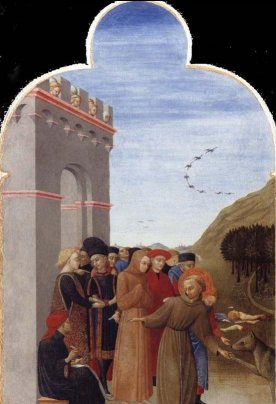
Sassetta: The Wolf of Gubbio
National Gallery, London
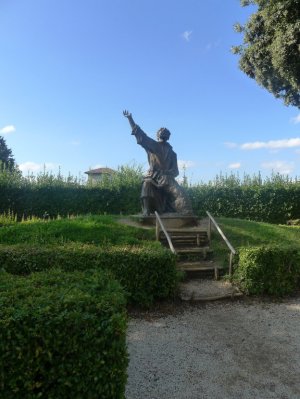
Gubbio. The statue of St Francis at the entrance to the town.
Gubbio is a beautiful, unspoilt Umbrian town. The legend of the deadly wolf is taken from The Little Flowers of St Francis.
At the time when St Francis was living in the city of Gubbio, a large wolf appeared in the neighbourhood, so terrible and so fierce, that he not only devoured other animals, but made a prey of men also; and since he often approached the town, all the people were in great alarm, and used to go about armed, as if going to battle. Notwithstanding these precautions, if any of the inhabitants ever met him alone, he was sure to be devoured, as all defence was useless: and, through fear of the wolf, they dared not go beyond the city walls. St Francis, feeling great compassion for the people of Gubbio, resolved to go and meet the wolf, though all advised him not to do so. Making the sign of the holy cross, and putting all his confidence in God, he went forth from the city, taking his brethren with him; but these fearing to go any further, St Francis bent his steps alone toward the spot where the wolf was known to be, while many people followed at a distance, and witnessed the miracle. The wolf, seeing all this multitude, ran towards St Francis with his jaws wide open. As he approached, the saint, making the sign of the cross, cried out: “Come hither, brother wolf; I command thee, in the name of Christ, neither to harm me nor anybody else.” Marvellous to tell, no sooner had St Francis made the sign of the cross, than the terrible wolf, closing his jaws, stopped running, and coming up to St Francis, lay down at his feet as meekly as a lamb. And the saint thus addressed him: “Brother wolf, thou hast done much evil in this land, destroying and killing the creatures of God without his permission; yea, not animals only hast thou destroyed, but thou hast even dared to devour men, made after the image of God; for which thing thou art worthy of being hanged like a robber and a murderer. All men cry out against thee, the dogs pursue thee, and all the inhabitants of this city are thy enemies; but I will make peace between them and thee, O brother wolf, is so be thou no more offend them, and they shall forgive thee all thy past offences, and neither men nor dogs shall pursue thee any more.” Having listened to these words, the wolf bowed his head, and, by the movements of his body, his tail, and his eyes, made signs that he agreed to what St Francis said. On this St Francis added: “As thou art willing to make this peace, I promise thee that thou shalt be fed every day by the inhabitants of this land so long as thou shalt live among them; thou shalt no longer suffer hunger, as it is hunger which has made thee do so much evil; but if I obtain all this for thee, thou must promise, on thy side, never again to attack any animal or any human being; dost thou make this promise?” Then the wolf, bowing his head, made a sign that he consented. Said St Francis again: “Brother wolf, wilt thou pledge thy faith that I may trust to this thy promise?” and putting out his hand he received the pledge of the wolf; for the latter lifted up his paw and placed it familiarly in the hand of St Francis, giving him thereby the only pledge which was in his power. Then said St Francis, addressing him again: “Brother wolf, I command thee, in the name of Christ, to follow me immediately, without hesitation or doubting, that we may go together to ratify this peace which we have concluded in the name of God”; and the wolf, obeying him, walked by his side as meekly as a lamb, to the great astonishment of all the people.
Preaching to the birds
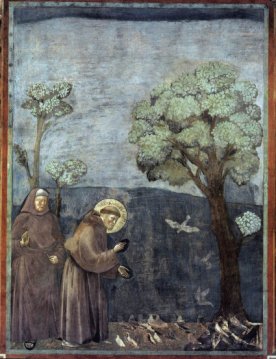
Francis Preaching to the Birds
Upper Church, San Francesco, Assisi
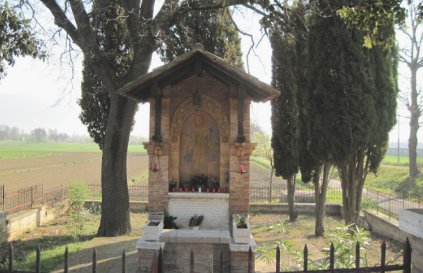
Traditionally the site of the preaching to the birds.
Pian D'Arca, Umbria.
The account by Bonaventure.
When he drew nigh unto Bevagna he came
unto a spot wherein a great multitude of birds of divers species were
gathered together. When the holy man of God perceived them, he ran with
all speed unto the place and greeted them as if they shared in human
understanding. They on their part all awaited him and turned toward him,
those that were perched on bushes bending their heads as he drew nigh
them, and looking on him in unwonted wise, while he came right among
them, and diligently exhorted them all to hear the word of God, saying:
“My brothers the birds, much ought ye to praise your Creator, Who hath
clothed you with feathers and given you wings to fly, and hath made over
unto you the pure air, and careth for you without your taking thought
for yourselves.” While he was speaking unto them these and other like
words, the little birds—behaving themselves in wondrous wise—began to
stretch their necks, to spread their wings, to open their beaks, and to
look intently on him. He, with wondrous fervour of spirit, passed in and
out among them, touching them with his habit, nor did one of them move
from the spot until he had made the sign of the Cross over them and
given them leave; then, with the blessing of the man of God, they all
flew away together. All these things were witnessed by his companions
that stood awaiting him by the way. Returning unto them, the simple and
holy man began to blame himself for neglect in that he had not afore
then preached unto the birds.
Back to page 1 Home page - explore the site
On to the next page - the Stigmata